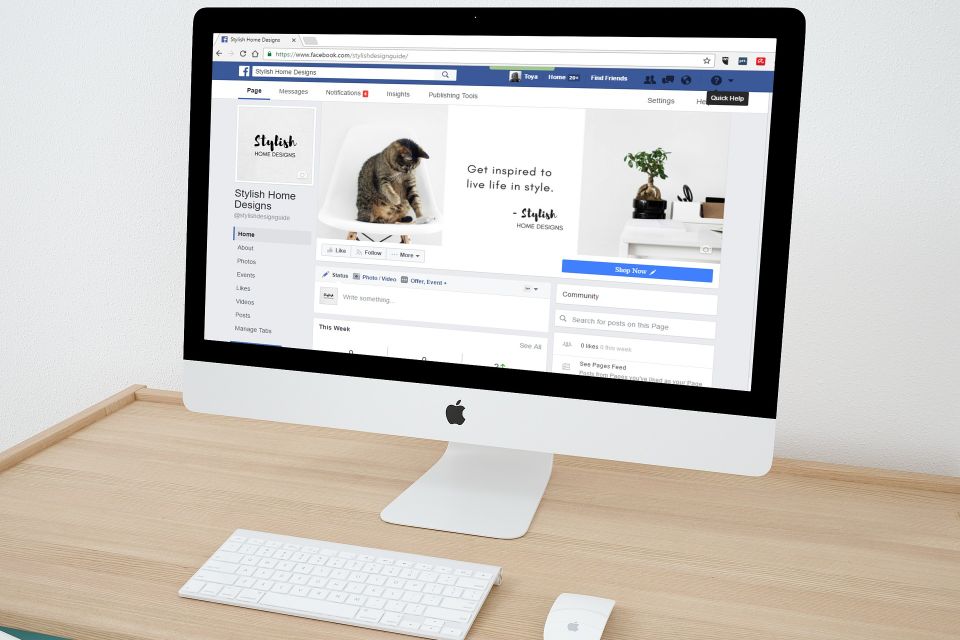In the world of promoting and establishing your small business online, projecting a robust and professional image is crucial. Nowadays, many businesses turn to social media platforms like Facebook to create that image. However, relying solely on a Facebook page as your primary online presence can be a significant mistake. In this article, we will delve into the top ten reasons why depending on a Facebook page as your main business platform is ill-advised. Additionally, we will explore alternative avenues for enhancing your online presence and effectively promoting your business.
1) Lack of Ownership.Perhaps the most notable drawback of using a Facebook page as your business platform is that you don't have actual ownership of it. The page belongs to Facebook, and they retain the authority to modify, delete, or even decrease its visibility in search results at any given time. This lack of control can be frustrating and potentially harmful to your business, especially if you've invested considerable time and effort in building your Facebook presence.
2) Exclusion of Non-Facebook Users.Despite Facebook boasting a user base exceeding two billion, there are still numerous individuals, particularly within younger and older demographics, who don't utilize the platform. Relying solely on a Facebook page for your online presence risks excluding these potential customers. While it's true that not everyone engages with social media, it's essential to consider all available channels for connecting with your target audience.
3) Constrained SEO Opportunities.Search Engine Optimization (SEO), the practice of enhancing a website's ranking in search results, plays a pivotal role in online visibility. While it's feasible to optimize a Facebook page to a certain extent, it restricts your ability to target specific keywords and create diverse content. Furthermore, a website's multi-page structure allows for multiple appearances in search results, unlike a solitary Facebook page. This can hinder potential customers' ability to discover your business online.
4) Potential Advertising Costs.Facebook operates on a "freemium" model, where creating a Facebook page and posting updates doesn't incur charges. However, the reach of these posts often remains limited. To broaden the reach of your posts and target a larger audience, you might need to invest in paid advertisements. Although this might not be a substantial expense for some businesses, it's essential to include it in your marketing budget considerations.
5) Functional Limitations.While a Facebook page permits posting updates, sharing images, and engaging with customers through Facebook Messenger, its functionality pales in comparison to a fully-fledged website. A website empowers you to create forms, integrate e-commerce capabilities, and design custom pages and posts with a broader array of formatting options.
6) Absence of a Sales Funnel.A sales funnel guides potential customers through a series of steps leading to a purchase. Websites leverage calls-to-action, landing pages, and other strategies to direct users through this process. With a Facebook page, you lack the same level of control, limiting your ability to guide users toward conversions.
7) Limited Content Variety.While it's possible to compose an "About Us" section and share updates on a Facebook page, it doesn't provide the space for in-depth content that can attract users and enhance your search engine ranking. Conversely, a website enables the creation of blog posts, articles, and other content formats that can help draw in and retain customers.
8) Restrictions in Branding.A Facebook page permits adding cover and profile images, but it offers limited branding opportunities beyond that. On the other hand, a website grants you the freedom to select color schemes, fonts, and design elements, enabling the creation of a consistent and professional appearance.
9) Challenges in Content Navigation.Websites excel in organizing, saving, and making pages and posts searchable. This streamlines the process of locating and revisiting older content. Conversely, a Facebook page's content organization features are more restrictive, with no option for content export. This makes it challenging for both you and your customers to find and reference previous posts.
10) Insufficient Analytics and Data.Finally, the analytics and data accessible on a Facebook page are not as extensive as those offered by a website. While Facebook does furnish information about post reach and engagement, it lacks the granularity and customization inherent to website analytics. This hampers your ability to measure the effectiveness of your marketing endeavors and make informed decisions based on data.
A Facebook business page should complement, not replace, a comprehensive website.For a thriving online business, a professional website is indispensable alongside a Facebook page. A website provides a platform to showcase your brand, feature products or services comprehensively, establish an effective sales funnel, and employ sophisticated analytics to refine your marketing strategies. While the allure of using a Facebook page as your primary online presence might be strong, its limitations make it a suboptimal long-term choice.
This is where our web design firm excels! We specialize in creating cost-effective, polished websites for businesses of all sizes. Our team of experienced designers and developers collaborates closely with you to fashion a website that mirrors your brand identity and aligns with your business objectives. Once your website is up and running, your Facebook page can serve as a catalyst to promote it and drive traffic.
Don't settle for a constrained online footprint. Invest in a professional website to propel your business to new heights.
Contact us today to explore how we can propel your business toward online success.


